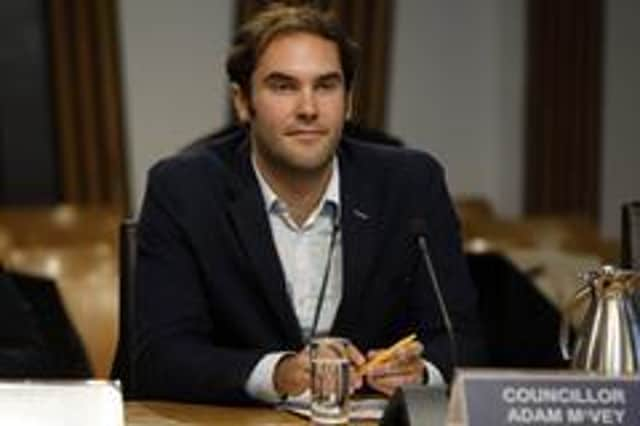Edinburgh children's homes abuse scandal is being compounded by culture of secrecy that betrays its victims – John McLellan


The ordeal of giving evidence to police and then facing cross-examination from defence lawyers is harrowing enough without then being judged in the court of public opinion.
It was for that reason that blogger Craig Murray was jailed last year for repeatedly flouting the terms of a court order not to identify witnesses in the Alex Salmond trial in which the former First Minister was acquitted.
Advertisement
Hide AdAdvertisement
Hide AdIn her judgement, trial judge Lady Dorrian said that although he did not positively identify the complainants, he understood and deliberately ran the risk he was taking and “relished” publishing enough information to allow their identities to be pieced together. He got eight months.
For a victim to voluntarily waive their anonymity takes enormous courage and belief that their experience needs to be exposed, almost always because they feel there is a wider issue of the welfare of others at stake, and that speaking out will add power to their message so some good can come from their trauma.
Into that category falls Holly Hamilton who as a teenager was sexually abused for six months by care worker Gordon Collins in an Edinburgh Council secure unit, and who this week told the Edinburgh Evening News, and then the BBC, what she had been through.
The assaults on Miss Hamilton took place 15 years ago, but Collins was only tried in 2016 after a cold case review produced evidence of repeated abuse of four underage girls and he was jailed for six years.


The council then conducted its own serious case review in 2017 which found the victims’ complaints had previously been dismissed because staff thought they were troublemakers or attention-seekers, and also revealed concerns about inappropriate restraint, isolation and other harsh treatment of the young people in the units.
It’s no surprise, therefore, that as a key witness in the investigation, Miss Hamilton was shocked to learn five years on that another council inquiry had uncovered virtually the same issues in the units and that "illegality, injustice and maladministration" went on long after Collins was jailed until another whistle-blower sounded the alarm in 2020.
The Evening News revealed the 2017 council review found young people were “at risk from punitive and sometimes painful measures of control by staff members. Many were also subject to isolation and removal of personal possessions, often unnecessarily and often for unnecessarily long periods."
It’s virtually identical to the findings of the latest report which makes over 40 recommendations for improvements and illustrates the extent to which the reforms identified in 2017 were not followed through.
Advertisement
Hide AdAdvertisement
Hide Ad“It just seems to be recommendation after recommendation. Every ten years the same recommendations but nothing ever changes,” said Miss Hamilton with every justification. “How many generations of broken children does this system need to create?" she asked.
For Miss Hamilton at least, getting these horrendous conditions out in the open matters, and that is in stark contrast to the actions of Edinburgh Council, which only made the latest report available to councillors under strict conditions of secrecy, to the extent that note-taking was prohibited, and only the very briefest outline was published in the agenda papers for the last full council meeting on March 17.
At that meeting the SNP-Labour administration, with the assistance of two Green councillors, voted against having any kind of debate of the issue because it was 5pm.
So a woman has the guts to speak out about the abuse she suffered at the hands of a council worker and how that kind of abuse has continued but, rather than have an open debate, Edinburgh Council’s leader Adam McVey told the Evening News that, as it was 5pm, there had to be a duty of care to staff and extending the meeting might impact on their welfare. If only the victims in St Katherine’s House had experienced the same level of concern for their welfare.
Yesterday, the council’s new director of education and children’s services, Amanda Hatton, wrote in the Evening News that her department is “working hard to put in place some immediate steps”.
In other words, the department has still to implement safeguards which should have been in place at least five years ago, yet her predecessor was able to walk away from the job 18 months ago with full notice payments and glowing tributes. Rather than reassuring, her article is an admission of abject failure.
Donna Ockenden’s inquiry into the heart-breaking tragedy at Shrewsbury and Telford NHS Trust found “it failed to investigate, failed to learn and failed to improve”, and while Edinburgh Council eventually did investigate what was happening in its secure units, the evidence shows it failed to learn or improve, and all the investigations and recommendations in the world will make no difference if they do not result in meaningful change.
Not only that, but the newly updated Scottish Standards Commission’s code of conduct requires councillors to “maintain and strengthen the public's trust and confidence in the integrity of the council”, which prioritises an authority’s reputation above all other considerations, and is the basis of a cover-up culture, not one of openness. The further duty to “project a positive image… and avoid making any public comments that could bring it into disrepute” is even more explicit.
Advertisement
Hide AdAdvertisement
Hide AdAnalysis of Shrewsbury in The Times cited “dreadful care, a reluctance to investigate and a defensive closing of ranks against families, all overseen by bosses who did not want to know”.
That too could apply to Edinburgh Council, which set such narrow parameters for last year’s review of management culture by Susanne Tanner QC that it failed to re-examine past cases, and as a result the whistle-blowers it should have satisfied instead believe it was a whitewash and want a public inquiry. After Holly Hamilton’s testimony this week, who can blame them?
John McLellan is a Conservative councillor in Edinburgh

